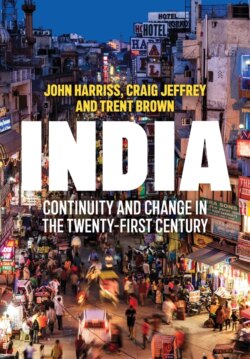Читать книгу India - Craig Jeffrey - Страница 17
Secularism
ОглавлениеThe birth of independent India brought, as well, the Partition of what had been British India, and the creation of the new state of Pakistan, as a homeland for Indian Muslims (for a fine account of Partition, see Khan 2007). This was the outcome of a long-standing fear of Hindu domination, articulated latterly by the Muslim League, under the leadership of Mohammed Ali Jinnah. Partition took place amid enormous bloodshed (perhaps as many as two million people were killed) and the largest single displacement of people (an estimated 15 million) in history. These events, and the antagonistic relationship between India and Pakistan, often focused on the status of Kashmir, as the only Indian state with a Muslim majority population, have cast an enduring shadow over South Asia (see chapter 14). A very large population of Muslims remained in India (it still has the third largest Muslim population in the world, and not too much smaller than that of Pakistan). But did they belong in India? For Nehru and other liberals in the Congress leadership, it was extremely important that Muslims should be reassured that they did belong. And the Constitution prohibited discrimination on grounds of religion, race, caste, sex or place of birth (Article 15), laid down the freedom of religion (Article 25), and the right among others, of every religious denomination ‘to manage its own affairs in matters of religion’ (Article 26).
Some of India’s leaders were committed to the idea that India should be a secular state. For them, communalism (the antagonism between communities defined by religion) was a product of unreason. Nehru, in particular, who detested religious dogmatism, looked forward to a society in which a scientific temper would prevail. Yet the word ‘secular’ appeared only once in the Constitution as it was originally drafted, and then only to refer to an aspect of religious practice. As we discuss in chapter 6, the view of secularism that is implicit in the Constitution is not of the radical separation of religion and the affairs of state, as is enjoined in the Constitution of the United States, but rather one of the equality of treatment of different religions. A ‘secular state in India’, Nehru wrote, ‘is a state which honours all faiths equally and gives them equal opportunities’ (cited by Madan 1997: 245).
This stance on his part represented a compromise that he was unhappy about. He, and those who thought like him, had to come to terms with the common view among Indians that theirs is a society in which religion has a particularly important place, and the view, too, that Hinduism is a uniquely tolerant religion. The idea of secularism as denoting equality of treatment of religions was a way of reaching a compromise with the currents of Hindu sentiment among even senior Congress leaders, some of whom were also members of the Hindu Mahasabha, the all-India association of Hindus. Though it was the Congress, which had its origins in an association of educated, middle-class professional people, that came to lead the struggle for independence, others had begun to organize as Hindus, against colonial rule, around such issues as that of cow protection, going well back into the nineteenth century. Hindu nationalism has deep historical roots, though the ascendancy in Indian politics of liberal-minded leaders like Nehru in the early years of post-colonial India tended to obscure its significance among many observers. So, the anthropologist T. N. Madan writes, ‘Nehru’s definition of the secular state in terms of religious pluralism was … a compromise, a strategy to deal with an awkward problem, namely the all-pervasive influence of religion in society, that would not go away’ (1997: 244).
The compromise exposed the state in the end, however, to accusations of ‘pseudo-secularism’ – particularly because of the unequal treatment of different religions in the field of personal law – that have helped to fuel the rise of Hindu nationalism. The accusation that the Hindu majority has been discriminated against by the state has provided powerful fuel for Hindu nationalists. Even as we were writing, in the course of the Indian national elections of 2019, the Congress was accused by some BJP politicians of being a party that wants to favour Muslims.
